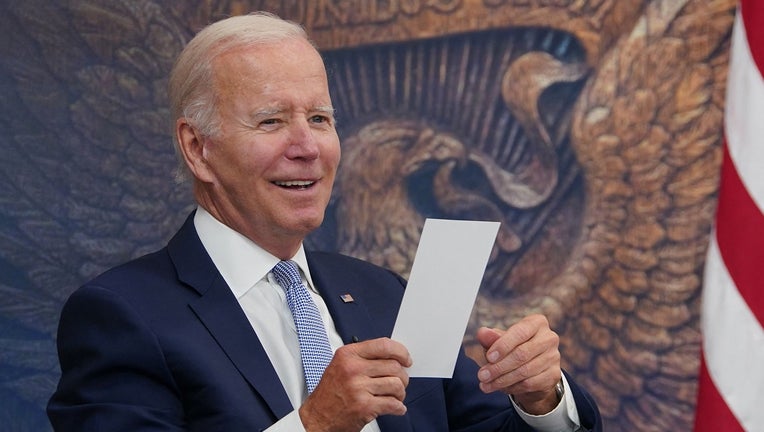Bill to increase microchip production passed by House, heads to Biden's desk

US President Joe Biden reacts to a note given to him saying that the CHIPS-plus bill has passed the House during a meeting with CEOs about the economy in the South Court Auditorium of the Eisenhower Executive Office Building, next to the White House,
ATLANTA - The U.S. House of Representatives passed a bill Thursday aimed at increasing domestic production of semiconductors and computer chips. The bill was already approved in the Senate and now heads to President Joe Biden's desk.
According to the Congressional Budget Office, the bill appropriates $54 billion to federal agencies including the Department of Commerce to institute programs to "strengthen" domestic production of semiconductors, microchips and telecommunication equipment.
"Georgia gets it done y'all! We just passed the #ChipsandScience Act, including @RepHankJohnson and @SenOssoff's bill to fund cybersecurity job training programs at HBCUs. This is a big win for the Fighting Fifth and all of our HBCUs! #HBCUStrong," Rep. Nikema Williams, D-Ga. 5th District, tweeted on Thursday afternoon.
In April, Sen. Warnock was assigned to the conference committee tasked with hammering out a compromise between the House and Senate versions of the legislation.
"This bill is really about three things: jobs, jobs and jobs. It's about jobs right now and jobs well into the future," said Sen. Rev. Raphael Warnock, D-Georgia.
Sen. Warnock said it will help address some supply chain issues the country has experienced in the wake of the COVID-19 pandemic because most of the world's microchips are currently produced in Asia.
CHIP SHORTAGE DRIVES UP AUTO PRICES, CUTS SALES
"The Kia plant in West Point, Ga., for example, had to shut down last year on a couple of occasions and the workers had to stay home missing money out of their paychecks not because of a lack of customers, but a lack of microchips," Sen. Warnock said.
The legislation also includes a section that provides additional federal funding for research and development and universities across the country.
"Investments in HBCUs, investments in some of our smaller universities like Middle Georgia State, like Columbus State where they're very bright, young people, but they often don't have access to the kinds of investments in STEM that make for a future in a STEM career," explained Sen. Warnock.
The overall price tag of the bill is about $280 billion.
Sen. Bernie Sanders, D-Vermont, spoke against the bill Wednesday, saying it "massive corporate welfare."
"What taxpayers are doing are rebuilding an industry that was destroyed by the industry itself by going abroad in search of more profit," said Sen. Sanders.
Warnock, however, said he was grateful to have played a part in getting the legislation passed.
"This is an investment in our people, and it's an investment in the future workplace, and I'm proud that we're able to get this done on a bipartisan basis," said Sen. Warnock. "Think about how seldom that happens here in Washington."
Biden is expected to sign the bill.
The Associated Press contributed to this report

